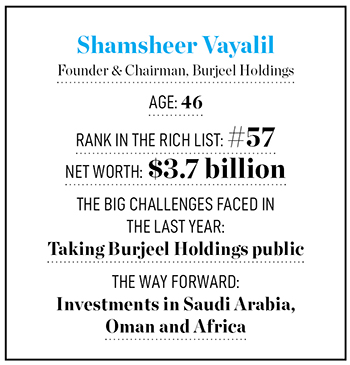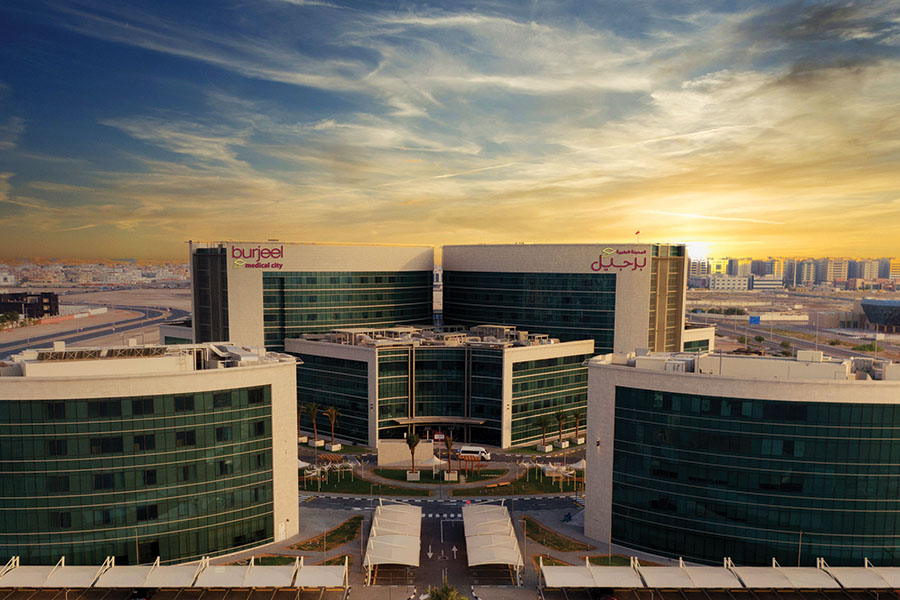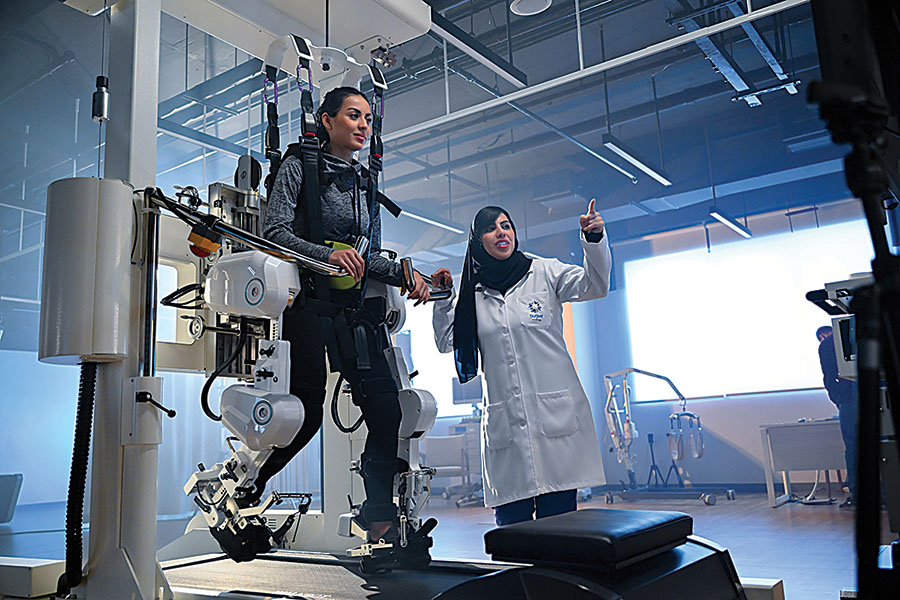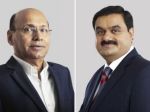
Shamsheer Vayalil: Building the largest hospital network in the Gulf
Shamsheer Vayalil, founder and chairman of Burjeel Holdings, has been building the biggest hospitals in the Gulf region over the last decade, and laying the groundwork to further expand the business empire
 Shamsheer Vayalil, Founder & Chairman, Burjeel Holdings Image: Mexy Xavier
Shamsheer Vayalil, Founder & Chairman, Burjeel Holdings Image: Mexy Xavier
They say shadows are always difficult to get rid of. Especially, when you have a father-in-law who overshadows you.
Not for Shamsheer Vayalil. The son-in-law of billionaire businessman MA Yusuff Ali, among the wealthiest and most powerful men in the Middle East, Vayalil has been busy building up one of the Gulf region’s biggest hospital networks for much of the past decade.
In the process, Vayalil has also become the most recognised of Ali’s heirs, especially after the public listing of his health care company, Burjeel Holdings, a UAE-based hospital operator. Over the past two years, Vayalil has seen his wealth skyrocket from $1.3 billion to $3.7 billion, making him the 57th richest man in India according to the 2023 Forbes India Rich List. That’s 30 spots behind his father-in-law.
“It was important to stand on my own feet,” Vayalil, dressed in a blue sweatshirt and blue jeans, tells me during a meeting in his office in Downtown Dubai.
Click here for Full 2023 Rich List
 Vayalil, unlike his carefully manicured persona on television interviews, is quite the opposite as he sits for an interaction with Forbes India. Jovial, quick-witted, loud and carefree, the radiologist by training is upfront about his struggles, particularly the burdens that come from allegations of nepotism. Quite often, especially in his home state of Kerala, Vayalil is linked to his father-in-law, although the duo has its businesses clearly demarcated.
Vayalil, unlike his carefully manicured persona on television interviews, is quite the opposite as he sits for an interaction with Forbes India. Jovial, quick-witted, loud and carefree, the radiologist by training is upfront about his struggles, particularly the burdens that come from allegations of nepotism. Quite often, especially in his home state of Kerala, Vayalil is linked to his father-in-law, although the duo has its businesses clearly demarcated. “People think it’s easy for me because I have a rich father-in-law. And I know kids of rich people or politicians who suffer with the use of the word nepotism,” Vayalil says. “My advice to them is, don’t listen. The more they pull you down, the more your ability to come up also rises.”
Through VPS Healthcare, Vayalil’s family office, Vayalil oversees an investment portfolio covering various segments of health care, including a hospital chain, Burjeel Holdings, an on-site health care provider, Response Plus, a pharmaceutical company, LIFEPharma, cosmetics maker Ziva, and a dental college, Educare Institute. He is also the largest investor in a private equity firm, Amanat Holdings, a Dubai-headquartered investor in health care and education.
“Health care is not always charity,” Vayalil says. “It’s about efficiency, service, saving lives, doing complex stuff, and it has evolved a lot. It has changed from sickness to wellness. Now we are talking longevity. A lot of research happens in our facility. We are doing Phase III trials. For us, it’s all about differentiation.”
Also read: Vivek Jain is positioning InoxGFL Group to tap global demand for EVs
From Kozhikode to Abu Dhabi
Life would have probably taken a different turn for Vayalil had the US government not rejected his visa application.It was soon after his marriage, and after moving to Abu Dhabi, that Vayalil toyed with the idea of moving to the US. He had planned to do a fellowship when, during his visa interview, he says he misspoke, partly due to his excitement, leading to his visa being cancelled without prejudice. That meant waiting for another six months to a year before he could reapply.
“I cried,” Vayalil says. “Because I had it all planned out. I had looked at flats and, thought I would spend three to five years getting a specialised degree. That was a big turning point. But in hindsight, I think the day that I thought was the worst day of my life turned out to be the best day.”
That’s because taking time to reapply for a visa meant working at the Sheikh Khalifa Medical City, a flagship institution for the Abu Dhabi Health Services. “Going back to Kerala was not an option,” Vayalil says. A middle child, he was born in Kozhikode (Calilcut), the largest city in the Malabar region of Kerala. A hub for trade, it was here that Vasco Da Gama first set foot in India.
 Burjeel Medical City in Abu Dhabi. Burjeel has over 16 hospitals and 30 medical centres across the Middle East and North Africa region
Burjeel Medical City in Abu Dhabi. Burjeel has over 16 hospitals and 30 medical centres across the Middle East and North Africa regionVayalil’s father was a businessman, trading in rice and food grains, and the children would spend their holidays with him in the bazaar (market) where Vayalil says he was introduced to the world of negotiations and conducting business. He followed his brother into studying medicine and after completing his medical degree from the Kasturba Medical College, run by the Manipal Group, Vayalil went on to do a specialisation in radiology from the Sri Ramachandra Medical College in Chennai.
“I couldn’t see myself as a great doctor,” Vayalil says. “It was always about helping people. I had an attraction towards technology and gadgets,” Vayalil says about picking radiology for his specialisation. It was while finishing his post-graduation that he was married to Shabeena, Ali’s eldest daughter, a dentist. After marriage, the couple moved to Abu Dhabi.
 In Abu Dhabi, Vayalil made good money after starting work at the Sheikh Khalifa Medical City, earning around $2,500 a month. But he was also equally wary about what he calls the Middle East comfort trap. “It was a nice life,” Vayalil says. “But my instinct began to kick in as I started meeting more people.” That’s when he decided to become an entrepreneur.
In Abu Dhabi, Vayalil made good money after starting work at the Sheikh Khalifa Medical City, earning around $2,500 a month. But he was also equally wary about what he calls the Middle East comfort trap. “It was a nice life,” Vayalil says. “But my instinct began to kick in as I started meeting more people.” That’s when he decided to become an entrepreneur.In 2006, after working for a year, Vayalil quit his job as he set out to build his own hospital. Within a year, when he turned 30, he had set up a multispecialty hospital in Abu Dhabi. That hospital, Lifeline, later renamed LLH, focussed on providing affordable care in the capital of UAE and was the fifth hospital to come up on a street that already had four other hospitals.
“I think doctors are good entrepreneurs because they make decisions every day,” Vayalil says. “With every patient, you must make a decision whether it’s right or wrong. Then it’s about how you make it right. I never believed in the right decision. I always believe that you need to take a decision and then work towards making it right. This is what we applied in our business when we started our first hospital.”
 Burjeel facilities use the Da Vinci Xi robotic system to ensure precision and innovation in medical procedures
Burjeel facilities use the Da Vinci Xi robotic system to ensure precision and innovation in medical procedures
Coincidentally, Vayalil’s entrepreneurial foray also took place around the same time as the Abu Dhabi government’s decision to make health insurance mandatory for its population, which meant that the health care sector in the country was set to undergo a transition. With insurance covering most health care costs, the population did not need to travel overseas or to their home countries for treatment.
“I knew that if I can give good service to people, they would stay back,” Vayalil says. “Insurance was the most disruptive decision in the health care space in Abu Dhabi. I felt that the private space could do more complex work if I could bring the quality of a government hospital and service in the private sector.”
Also read: K.P. Ramasamy: Playing the long game in garment exports
Building ground up
Building his first hospital came with its own challenges. Vayalil was about 29, and had spent a bulk of his time in hospitals and practising medical care. As a radiologist, much of his career was spent in basements of hospitals, since radiology departments are often set up there.“I was working crazy,” Vayalil says. “I would often go home early morning. I was at the construction site throughout.” From his father, he says he learnt the value of building relationships, something he banked on while setting up his business. “We didn’t have too many vendors,” Vayalil says. “We were dealing with a handful, and that helped us build a relationship that we wanted.”
 The initial capital came from a mix of funding from his father-in-law, banks and his own equity. “It was a slow start,” Vayalil says, when I ask him if he took advice from his father-in-law, a veteran in doing business in the Middle East. “I follow my heart. I don’t take advice when I don’t need advice. I tell my children the same thing. Don’t ask for advice when you don’t need it.”
The initial capital came from a mix of funding from his father-in-law, banks and his own equity. “It was a slow start,” Vayalil says, when I ask him if he took advice from his father-in-law, a veteran in doing business in the Middle East. “I follow my heart. I don’t take advice when I don’t need advice. I tell my children the same thing. Don’t ask for advice when you don’t need it.” Soon, Vayalil followed up his first hospital with another in the industrial district of Musaffah in Abu Dhabi. He also considered going to business school. “I was desperate to take an MBA those times,” Vayalil says. “Now I think it was good that I didn’t get one. I go by my gut because I think that gut is very important. The feeling that you get, the chemistry that you make, for me, that is more important than balance sheets.”
Today, Burjeel has over 16 hospitals and 30 medical centres across the Middle East and North Africa (MENA) region. Its hospital network is split between Burjeel Hospitals, Medeor Hospitals, LLH Hospitals and Lifecare Hospitals. With over 1,600 beds, Burjeel has the highest number of hospital beds in the UAE, and offers everything from cancer care to mother and child care services, treating over six million patients a year.
Burjeel Medical City (BMC), the group’s flagship hospital in Abu Dhabi, is the largest private hospital and comprehensive cancer centre in the UAE. In addition, the hospital also offers cutting-edge technologies, including utero spina bifida repair and gynaecological interventions for conditions, including endometriosis.
 The Burjeel Medical City boasts one of UAE’s most advanced rehab facilities with innovative tech and expert staff
The Burjeel Medical City boasts one of UAE’s most advanced rehab facilities with innovative tech and expert staff“We started reinvesting everything,” Vayalil says. “Business was good, and people started trusting. There was a very big gap in the market, and we were there at the right time in the right place with the right product.” It also helped that, Vayalil says, the UAE is an easy country to do business in. “In this country, you don’t have to worry about anything else,” he adds. “You get to completely focus on what you must do. There is nothing else you need to look after, and that undivided attention helps you prosper as well.”
All that has meant that Vayalil, through Burjeel, wants UAE to emerge a premier destination for health care in the region, helping thousands of patients avoid travel to the US and Europe. “I think there is a huge requirement for services because people who normally used to travel to the US are finding it difficult to get visas and travelling when you’re sick is also something very difficult,” he says.
Today, with his business in UAE having scaled to a significant size, Vayalil is laying the groundwork for the next phase of growth with investments into Saudi Arabia, Oman and Africa, where he sees enormous opportunities in the coming years. Saudi Arabia is in the middle of one of the most consequential cultural transitions under its de facto ruler Mohammed Bin Salman. MBS, as he is known, is bringing a generational shift with the oil-rich country moving away from oil dependence, as it looks to diversify its income sources in addition to liberalising the country along the likes of the UAE. Burjeel has lined up investments of up to $1billion in Saudi Arabia through joint ventures and public-private partnerships.
“Saudi is important for us in our next phase of growth,” Vayalil says. “And we’re not trying to take any product and plug it there. We are creating new products based on our learnings over the last 17-18 years.”
Also read: Landmark Group, now with Renuka Jagtiani at the helm, is in expansion mode
 Burjeel uses advanced technologies like the 1.5T intraoperative iMRI, 3 Tesla MRI, and 3DimensionsTM Mammography System
Burjeel uses advanced technologies like the 1.5T intraoperative iMRI, 3 Tesla MRI, and 3DimensionsTM Mammography SystemHitting the jackpot
Still, Vayalil’s finest hour came last year when he decided to list Burjeel Holdings. The company was the first private sector company to go public in the UAE in 2022 when it raised over $300 million through its IPO.The IPO was scaled down after International Holding Co (IHC), a company chaired by UAE’s national security adviser, Sheikh Tahnoon Bin Zayed Al Nahyan, and the brother to the UAE president bought a 15 percent stake in the company. IHC is the UAE’s largest company by market value. The IPO itself was a resounding success with the shares being oversubscribed 29 times.
Vayalil’s holding company, VPS Healthcare Holding, meanwhile, continues to be the largest investor in Burjeel Holdings with a 70 percent stake. “We were leaving a lot of value on the table,” Vayalil says. “We were at asset utilisation of less than 40 percent. We had a new hospital and I think it was about scaling up because we didn’t want to be a typical family office.” Today, a bulk of Vayalil’s health care business includes three categories. A pre-hospital care business, hospitals and pharmaceuticals.

Response Plus, a publicly listed company, and the group’s pre-hospital business, is the largest provider of onsite health care, occupational health solutions and medical emergency services, in the UAE. The company boasts an infrastructure that includes a fleet of over 350 ambulances, 260 on-site clinics, and 1,600 health care workforce.
In the pharma segment, the company operates LIFEPharma, the only USFDA-approved pharmaceutical manufacturer in the UAE, and makes everything from tablets to molecules. “For me, the strength is the patient,” Vayalil says. “If you take the patient, three things are important. Data, technology and people. These are the pillars we are focusing on.”
Within the hospital business under Burjeel, the group has split into four categories. Lifecare hospitals focus on an industrial clientele while Medeor hospitals focus on mother and child care, congenital malformation surgeries of the brain and spine, cardiology, pulmonology, urology, dialysis, and critical care, gastroenterology, and advanced laparoscopic and gynaecological surgeries, among others. LLH Hospitals focus on a mix of patients, mainly from the Indian diaspora while Burjeel is the flagship hospital network focusing on advanced therapies. “We are a concierge service and I think that’s what we are moving towards,” Vayalil says.
Since its listing, Burjeel Holdings has already distributed some AED 95 million in dividends. The group also operates a hospital in India, the Lakeshore Hospital in Ernakulam, and has already exited a hospital that it ran in Delhi. That also means that the group is now readying its re-entry into the country. “Our re-entry is getting planned,” Vayalil says. “It’s a learning curve in India. We learnt what to do and what not to do.” He had also resigned as the vice chairman and managing director of Amanat Holdings in 2021, and could possibly make a return soon.
In it all, he says, his guiding principle remains not allowing success to get to his head. “I am a servant for the patient,” Vayalil says. “We want to be a significant player, not a substantial player.”
He may have started in the basements, but Vayalil has already built towers that are difficult to come crashing now.
Post Your Comment


















